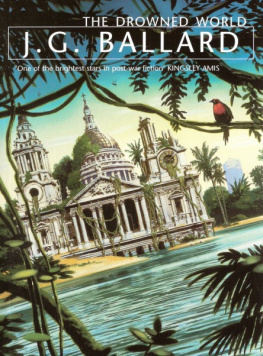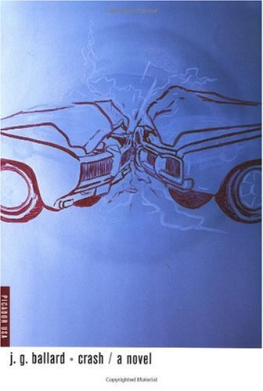The Drowned World
By
J.G. Ballard


"In a completely sane world, madness is the only freedom!"
-Contents-
Soon it would be too hot. Looking out from the hotel balcony shortly after eight o'clock, Kerans watched the sun rise behind the dense groves of giant gymnosperms crowding over the roofs of the abandoned department stores four hundred yards away on the east side of the lagoon. Even through the massive olive-green fronds the relentless power of the sun was plainly tangible. The blunt refracted rays drummed against his bare chest and shoulders, drawing out the first sweat, and he put on a pair of heavy sunglasses to protect his eyes. The solar disc was no longer a well-defined sphere, but a wide expanding ellipse that fanned out across the eastern horizon like a colossal fire-ball, its reflection turning the dead leaden surface of the lagoon into a brilliant copper shield. By noon, less than four hours away, the water would seem to burn.
Usually Kerans woke at five, and reached the biological testing station in time to do at least four or five hours' work before the heat became intolerable, but this morning he found himself reluctant to leave the cool, air-curtained haven of the hotel suite. He had spent a couple of hours over breakfast alone, and then completed a six page entry in his diary, deliberately delaying his departure until Colonel Riggs passed the hotel in his patrol boat, knowing that by then it would be too late to go to the station. The Colonel was always eager for an hour of conversation, particularly when sustained by a few rounds of aperitif, and it would be at least eleven-thirty before he left, his thoughts solely upon lunch at the base.
For some reason, however, Riggs had been delayed. Presumably he was carrying out a longer sweep than usual of the adjacent lagoons, or perhaps was waiting for Kerans to arrive at the testing station. For a moment Kerans wondered whether to try to reach him on the radio transmitter installed by the signals unit in the lounge, but the console was buried under a pile of books, its battery flat. The corporal in charge of the radio station at the base had protested to Riggs when his cheerful morning round-up of old pop songs and local news-an attack by two iguanas on the helicopter the previous night, the latest temperature and humidity readings- had been cut off abruptly half-way through the first installment. But Riggs recognised Kerans' unconscious attempt to sever his links with the base-the careful haphazardness of the pyramid of books hiding the set contrasted too obviously with Kerans' otherwise meticulous neatness-and tolerantly accepted his need to isolate himself.
Leaning on the balcony rail, the slack water ten storeys below reflecting his thin angular shoulders and gaunt profile, Kerans watched one of the countless thermal storms rip through a dump of huge horse-tails lining the creek which led out of the lagoon. Trapped by the surrounding buildings and the inversion layers a hundred feet above the water, pockets of air would heat rapidly, then explode upwards like escaping balloons, leaving behind them a sudden detonating vacuum. For a few seconds the steam clouds hanging over the creek dispersed, and a vicious miniature tornado lashed across the 6o-feet-high plants, toppling them like matchsticks. Then, as abruptly, the storm vanished and the great columnar trunks subsided among one another in the water like sluggish alligators.
Rationalising, Kerans told himself that he had been wise to remain in the hotel-the storms were erupting more and more frequently as the temperature rose-but he knew that his real motive was his acceptance that little now remained to be done. The biological mapping had become a pointless game, the new flora following exactly the emergent lines anticipated twenty years earlier, and he was sure that no-one at Camp Byrd in Northern Greenland bothered to file his reports, let alone read them.
In fact, old Dr. Bodkin, Kerans' assistant at the station, had slyly prepared what purported to be an eyewitness description by one of Colonel Riggs' sergeants of a large sail-backed lizard with a gigantic dorsal fin which had been seen cruising across one of the lagoons, in all respects indistinguishable from the Pelycosaur, an early Pennsylvanian reptile. Had the report been taken at its face value-heralding the momentous return of the age of the great reptiles-an army of ecologists would have descended on them immediately, backed by a tactical atomic weapons unit and orders to proceed south at a steady twenty knots. But apart from the routine acknowledgement signal nothing had been heard. Perhaps the specialists at Camp Byrd were too tired even to laugh.
At the end of the month Colonel Riggs and his small holding unit would complete their survey of the city (had it once been Berlin, Paris or London? Kerans asked himself and set off northward, towing the testing station with them. Kerans found it difficult to believe that he would ever leave the penthouse suite where he had lived for the past six months. The Ritz's reputation, he gladly agreed, was richly deserved-the bathroom, for example, with its black marble basins and gold-plated taps and mirrors, was like the side-chapel of a cathedral. In a curious way it satisfied him to think that he was the last guest who would stay at the hotel, identifying what he realised was a concluding phase of his own life-the northward odyssey through the drowned cities in the south, soon to end with their return to Camp Byrd and its bracing disciplines-and this farewell sunset of the hotel's long splendid history.
He had commandeered the Ritz the day after their arrival, eager to exchange his cramped cabin among the laboratory benches at the testing station for the huge, high-ceilinged state-rooms of the deserted hotel. Already he accepted the lavish brocaded furniture and the bronze art nouveau statuary in the corridor niches as a natural background to his existence, savouring the subtle atmosphere of melancholy that surrounded these last vestiges of a level of civilisation now virtually vanished forever. Too many of the other buildings around the lagoon had long since slipped and slid away below the silt, revealing their gimcrack origins, and the Ritz now stood in splendid isolation on the west shore, even the rich blue moulds sprouting from the carpets in the dark corridors adding to its 19th century dignity.
The suite had originally been designed for a Milanese financier, and was lavishly furnished and engineered. The heat curtains were still perfectly sealed, although the first six storeys of the hotel were below water level and the load walls were beginning to crack, and the 250-amp air-conditioning unit had worked without a halt. Although it had been unoccupied for ten years little dust had collected over the mantelpieces and gilt end-tables, and the triptych of photo graphic portraits on the crocodile-skin desk-financier, financier and sleek well-fed family, financier and even sleeker fifty-storey office block-revealed scarcely a blemish. Luckily for Kerans his predecessor had left in a hurry, and the cupboards and wardrobes were packed with treasure, ivory-handled squash rackets and handprinted dressing gowns, the cocktail bar stocked with an ample supply of what were now vintage whiskeys and brandies.
A giant Anopheles mosquito, the size of a dragon-fly, spat through the air past his face, then dived down towards the floating jetty where Kerans' catamaran was moored. The sun was still hidden behind the vegetation on the eastern side of the lagoon, but the mounting heat was bringing the huge vicious insects out of their lairs all over the moss-covered surface of the hotel. Kerans was reluctant to leave the balcony and retreat behind the wiremesh enclosure. In the early morning light a strange mournful beauty hung over the lagoon; the somber green-black fronds of the gymnosperms, intruders from the Triassic past, and the half-submerged white-faced buildings of the 20th century still reflected together in the dark mirror of the water, the two interlocking worlds apparently suspended at some junction in time, the illusion momentarily broken when a giant water spider cleft the oily surface a hundred yards away.
Next page














